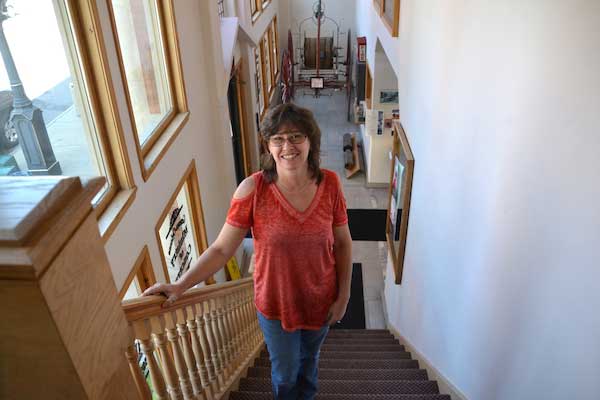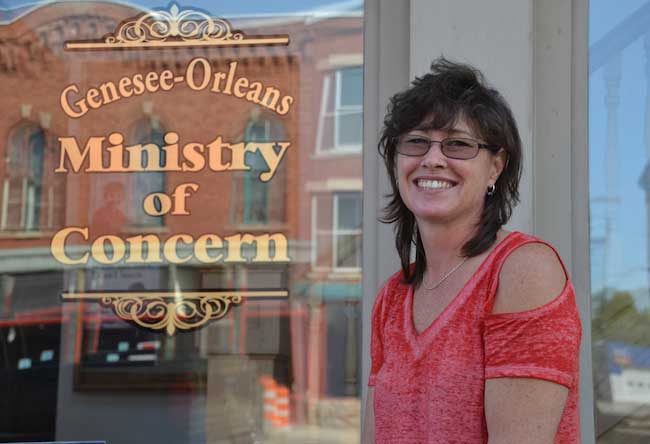Advocate sees first-hand the challenges facing many needy families
Jacki Mowers-Sciarabba was honored by the Chamber of Commerce for her work at the Ministry of Concern
ALBION – Jacki Mowers-Sciarabba spends her workdays helping people avoid shut-off notices and obtain needed housing and health insurance. The job is stressful and takes a lot of problem-solving.
“She listens to people on a deep level,” said Nyla Gaylord, executive director for the Genesee-Orleans Ministry of Concern. “She shows extraordinary kindness, concern and creativity in helping people through a crisis.”
Mowers-Sciarabba is a full-time client advocate at the Ministry of Concern. She also is program coordinator for Just Friends E-3 youth mentoring program. That program stresses energy, encouragement and empowerment.
The program has monthly activities and could use more adults, Mowers-Sciarabba said. There are 59 kids in the program in Orleans County.
The Ministry of Concern serves about 2,000 people in the county, helping with personal care items, prescription co-pays, emergency shelter and some utility bills.
The Orleans County Chamber of Commerce last month presented Mowers-Sciarabba with a community service award for her work with local families.
Mowers-Sciarabba has worked four years at the Ministry of Concern. The Kendall native was pharm tech at the Holley Pharmacy when she decided to earn her college degree in human services.
She helps people with budgeting with the long-term goal for more people to become self sufficient.
During an interview last month at the Ministry of Concern’s office at 121 North Main St., Albion, Mowers-Sciarabba said the job has been an eye-opener, showing “devastation” in the community.
Question: You said you didn’t realize the devastation in the county. What do you mean by that?
Answer: I didn’t realize the lack of employment opportunities and how many are in need of food stamps and public assistance, basic help with personal care items – diapers, things of that nature. It is something I had never thought of before until I was in this position and I see it every day.
After I was here after a while I saw people who were here frequently for the same thing so limits had to be made and budgeting had to be discussed. That’s why I get into helping them develop a budget so they didn’t need the services of the agencies. I didn’t realize how many people were in need of so many things.
Question: People might think there is Section 8 and welfare that cover all of the needs?
Answer: There is, but there is a waiting period for everything. If you go in and apply for Medicaid, you have a 45-day wait. Where are they going to get their prescriptions in the meantime? The people on necessary prescriptions they can’t be without it. They will end up in jail or an institution. We help them get through that. We help them get through the time period until they can get what they need. The time period is a killer for so many.
With the insurance change there were so many people who all of sudden didn’t have insurance when they went to their pharmacy – their pharmacy no longer took that insurance. So then there is the whole process of finding a pharmacy that does so people can get their medication. We help them apply for a different insurance. It’s a process. It’s a time-consuming process. For people who aren’t familiar with the system and how to do it, it’s very confusing. A lot of elderly people have no idea how to do it. It’s my job to walk them through, get them on the right track, and hook them up with the navigator.
Question: Was that a big learning curve for you?
Answer: It was. I had never dealt with insurance because I had always had insurance through my employer. I really never had to apply for it. I just signed up for it. It was a big learning curve for me. The health navigator through Fidelis has been great. She walked me through it. I hook people up with them. Neighborhood Legal Services had a health navigator and they did their appointments in our office for their Albion clientele.

Jacki Mowers-Sciarabba tries to help residents through the bureaucracy to getting health insurance, public assistance, needed furniture and medications.
Question: How many caseloads do you have?
Answer: It depends on the season. It depends on the day. In-office traffic is much less during rainstorms because many people walk or they have to wait for a bus, so I get a lot of phone calls on those days. It varies per situation. Right now is a busy time because the Village of Albion is giving out water disconnections. If you get your water disconnected, you’re condemned from your house. So our choice is do we help with the water bill that is due, or do we help with emergency housing that ends up costing a lot more and is a temporary fix?
You can’t have a displaced family. You can’t put them in Dollinger’s because it’s not economical. Usually it’s cheaper to help them pay the water bill by kicking in a hundred dollars. We try to find a way to come up with the difference.
Question: It seems like this would be a tough job?
Answer: It is a tough job. First of all you see families in a point of a panic due to a utility being turned off and not having the money to pay whatever the situation may be. I consider it my role to put them at ease. That’s what I do. I try to be calm because there’s always a way to figure it out. So that’s a good feeling when we do.
Emotionally it is difficult to see situations. Every day is different. There are no two days the same. You never know who’s going to come in with what situation and what they’re going to need and who can help them.
Question: It’s good that people see this agency as a place to help. I know the Ministry of Concern is considered “The agency of last resort.”
Answer: We are. They go through all the hoops before they come to me. Or in certain circumstances the monies they need are so much that I have to refer them out and they have to come back with a denial for us to consider. There are only so many funds for so many people.
Question: Do you sometimes function as a connector to other agencies?
Answer: I never send someone out without having someone else for them to go to for the assistance that they need. We don’t help with rent or security deposits and that is an issue. Nobody in this county helps with security deposits. Community Action and DSS do first month’s rent, but there is limited funding.
Question: So people could need $500 or more for a security deposit?
Answer: Absolutely. The typical one is generally between $500 and $700, and then there is the matter of finding apartments. The landlords are often booked.
It is very difficult. They have to go through the application process. There is nothing quick when it comes to housing. So therefore how many nights can we pay for someone to stay at Dollinger’s? We used to have a rule for one night and you have to have a place to go by 11 o’clock the next morning. So if they needed one night’s lodging before they could move into their apartment, that was fine. But that is so often not the case. If the people are being evicted on a Thursday, they won’t get into DSS until Monday. What do they do for the weekend with their kids? What are they supposed to do?
I’m not one to encourage people to sleep in their cars. It’s not the heating season so DSS won’t help them with emergency housing. It has to be 40 degrees or lower for them to help with emergency housing. That displaces a lot of families.
I’m grateful that Dollinger’s is in this town. That’s all that I have to say. It’s a good place for people to stay while they get their paperwork together and make calls. If they were just out walking on the street with their kids as an emotional wreck, they wouldn’t accomplish any of that and it would just prolong what they need to do.
Question: You are doing a community service in this job.
Answer: It’s work that needs to be done. Because we’re a non-for-profit, we don’t have the regulations that so many other agencies have to do. Although we take that information for our funding proposals. If somebody makes over the poverty level and they are in need of a coach, I still take their request.
If someone makes over the poverty level and they need help with their insulin, I’m not going to turn them away.
Question: You must see some success stories with people who have a dramatic turnaround.
Answer: I do. I’ve seen success stories with Just Friends, too. Children who were in the program when it started are now mothers who are bringing their children back. This one mother in particular just loves the program and wants her children to be here. That makes me happy.






































































